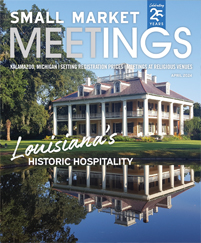Two problems in business — negativity and not listening — might have an uncommon and seemingly unorthodox cure: improvisation, the art or act of composing, uttering, executing or arranging anything without preparation.
Although improv immediately makes us think of comedy and the stage, it is a skill we all use all the time. The oven goes out right before company comes, so we improvise by cooking the meatloaf in a skillet on the stovetop. Our son’s Halloween mask melts, so we improvise, using makeup to turn him into a scary monster.
Since the 1990s, improv has been used to improve business communication. Jessie Shternshus wasn’t in on the act back then, but now, with seven years at the helm of her firm, the Improv Effect (www.theimproveffect.com) in Jacksonville, Florida, the 30-something is a pro at putting improv to work in the workplace.
“Improv is about reacting to the moment,” she said. “It is asking ‘What does this moment call for, and how do I play the right role to get to where I need to go.’”
The lucky among us have attended Shternshus’ improv class or a similar one. Even those who haven’t can learn to use simple improv principles in the workplace. Here are two ideas from Shternshus.
The Power of ‘Yes, and…’
Of all improv techniques, “Yes, and…” is the most powerful. “Not only is it the cornerstone of improv,” said Shternshus “but it is also the easiest technique.”
Here’s how it might work in a brainstorming session:
Person 1: “Let’s have our reception at the history museum.”
Person 2: “Yes, and let’s see if they have an expert to give a short presentation.”
Person 3: “Yes, and let’s see if the presentation could tie in to the history of our company.”
The brainstorm could have stopped anywhere along the way with a “No” or a “Yes, but… .” “Yes, and…” allows ideas to sprout instead of being squashed.
“The mentality of ‘Yes, and…’ is that every idea on the table is worth hearing and worthy of exploring,” said Shternshus. “You are validating the idea and pushing it forward so that one idea builds off the next and the next.
“It is a great tool for collaboration. It allows everyone to be heard and build off each other. Even if their idea ultimately is not the one chosen, they will go along for the ride because their idea is part of what got the group there.”
The ABCs of Listening
We are all, at times, bad listeners. But if your response hinges on what someone else is saying, you will pay attention. That’s the principle behind an improv exercise where small groups build a story. The trick is that people are chosen at random to add to the story, and each addition must begin with the next letter of the alphabet. Here’s an example:
Person 1: “Albert came home from school with a sore throat. Person 2: “Before he got home he stopped at the drugstore.” Person 3: “Cold winds on his walk caused him to cough.”
“Symbolically, this exercise does a ton of things,” said Shternshus.
For one, it creates a sense of community. And people listen. “They don’t know when they will be called, and if they aren’t paying attention, they won’t be able to contribute in a meaningful and logical way,” she said.
This exercise, slightly modified, makes a good icebreaker at small meetings. Instead of standard circle-the-table introductions, participants are called upon at random to introduce themselves. In their introduction, they must work in a connection to the person who spoke just before them, based on that person’s introduction.
“You go from people doodling until it is their turn to being on their feet, listening to what other nuggets connect them to you,” said Shternshus.
With practice, you can learn to mold the powers of improv to fit any scenario, said Shternshus. “It is a tool set. What I am trying to do is apply it to work, to real life. We can all be better at it.”
Vickie Mitchell is the former editor of Small Market Meetings. If you have ideas for future columns, contact her at vickie@smallmarketmeetings.com.











